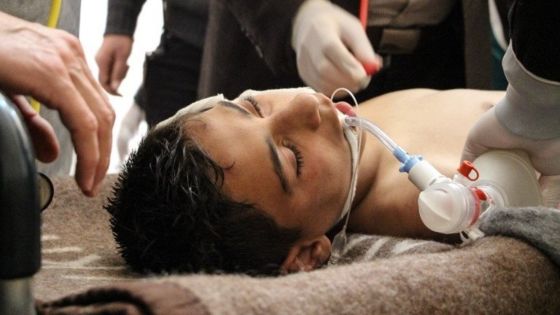
The search for a unified approach to the Syria conflict after last week`s suspected chemical attack looks set to dominate talks between the G7 group of leading nations in Italy on Monday.
Foreign ministers will focus on how to pressure Russia to distance itself from Syrian President Bashar al-Assad.
Allies will also be seeking clarity from the US on its Syria policy, after some apparently mixed messages.
US Secretary of State Rex Tillerson strongly criticised Russia on Sunday.
He said it had failed to prevent Syria from carrying out a chemical attack on the rebel-held town of Khan Sheikhoun last Wednesday which left 89 people dead.
But he also clarified there had been "no change to our military posture" in Syria following a retaliatory US strike against a Syrian airbase, and that Washington`s "first priority" in Syria was to defeat the Islamic State terror group.
Those comments came a day after the US ambassador to the United Nations said there was no way to stabilise Syria with Mr Assad as president.
"In no way do we see peace in that area with Assad as the head of the Syrian government," Nikki Haley told NBC`s "Meet the Press".
However, she had said last week that Mr Assad`s removal was no longer a US priority.
What are the options for pressuring Russia?
BBC diplomatic correspondent James Robbins says the next two days will be dominated by a collective search for arguments to persuade President Vladimir Putin he must now end Russia`s military support for President Assad and help accelerate a negotiated political transition.
UK Foreign Secretary Boris Johnson is expected to press the case for new sanctions against Russia if Moscow does not give ground.
Russia is already under a raft of sanctions imposed by the US and EU in response to the annexation of Crimea and the crisis in eastern Ukraine. These target Russian individuals and businesses, and key sectors of the Russian economy closely connected to the ruling elite.
Mr Tillerson wants to go on from the G7 talks to Moscow, able to confront the Russians with a strong set of demands backed by key US allies.
Sanctions already on Russia over Crimea
What is US policy on Syria?
The strike on the Shayrat airbase is the kind of direct intervention in Syria`s six-year-old civil war that Donald Trump`s predecessor, Barack Obama, had avoided.
As analyst PJ Crowley wrote in a recent BBC News article, Mr Obama chose to define America`s vital interest in Syria narrowly, defeating the so-called Islamic State without getting more deeply involved in another costly Middle East quagmire.
Until Friday`s strike, so did Mr Trump. He opposed military action in 2013 and campaigned on a platform of fixing problems in America, not Syria.
But while viewing the strike as decisive, most commentators are not seeing a radical change in the US approach to Syria.
White House sources were quick to dismiss any difference in nuance between Nikki Haley`s comments and administration policy as "inadvertent and unintentional".
Meanwhile, Rex Tillerson`s statement about "no change to our military posture" made it clear that Washington still regards the number one priority in Syria to be the elimination of so-called Islamic State.
Is Trump slipping into Syria quagmire?
Trump acts decisively in Syria: Now what?
How have Syria and its allies responded?
Syria has denied using any chemical agents, and Russia says the US has failed to provide evidence Syria has chemical weapons.
Russia and Iran, President Assad`s key military backers, are also threatening retaliation if there are any further American air strikes, saying the US attack had crossed "red lines".
"From now on we will respond with force to any aggressor or any breach of red lines from whoever it is and America knows our ability to respond well," said a statement on Sunday from a joint command centre comprising the forces of President Assad`s allies.
Our diplomatic correspondent says it is far from clear that Russia`s attitude to Syria has shifted at all since the gas attack and retaliatory strike.
Not so long ago Donald Trump was the darling of the Russian media. Not so any more.
A headline on Monday in the Russian government newspaper Rossiyskaya Gazeta says: "Aggression: Seven reasons for alarm after the US strike on Syria".
Syria `chemical attack`: What we know
Why was Shayrat airbase bombed?
Shayrat airbase was the target of the US` first deliberate direct attack on Syrian forces since the start of the war six years ago. Some 59 cruise missiles were fired at the facility in response to the suspected chemical weapons attack.
Pentagon spokesman Capt Jeff Davis said Shayrat airbase was used to store chemical weapons, and that US intelligence assessed that aircraft from there had dropped bombs filled with a nerve agent on Khan Sheikhoun.
Mr Assad has denied ever having used chemical weapons. Russia said the Syrian jets had hit a rebel depot full of chemical munitions.
Why was Shayrat airbase bombed?
What is the G7?
The G7 group of leading nations consists of Canada, France, Germany, Italy, Japan, the UK, and the US, with the European Union also represented. Foreign ministers are meeting in the city of Lucca, in Tuscany on Monday and Tuesday.
On Tuesday, Mr Tillerson will continue from the G7 to Moscow, where he will meet his Russian counterpart, Sergei Lavrov.


0 comments:
Post a Comment